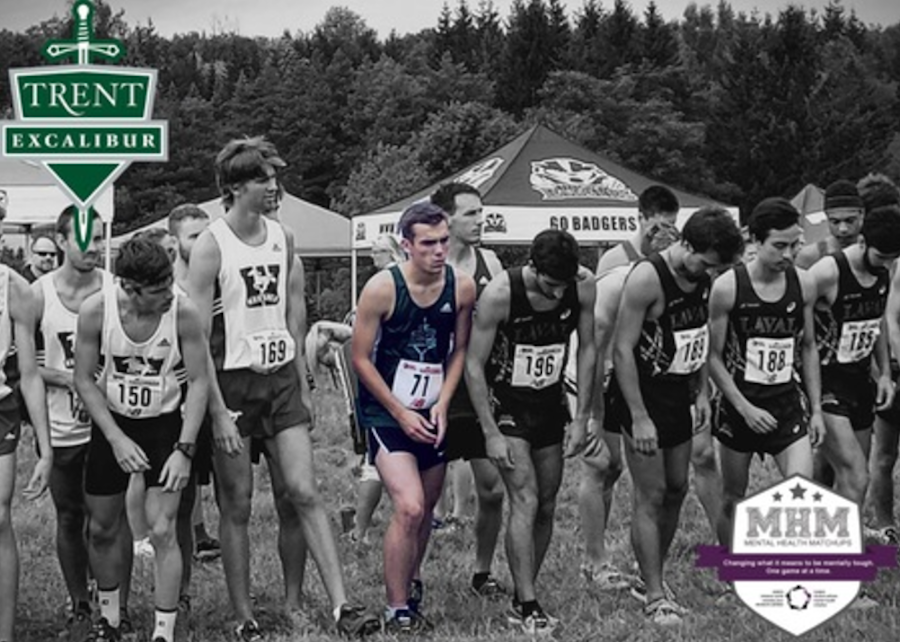Men’s Cross Country
Monday Morning Quarterback: Dinos claim Hardy Cup on last-second record field goal, Carabins and Capers claim soccer titles


Matthew Melo

 Matthew Melo is a fourth-year undergraduate student and varsity cross country captain with the Trent Excalibur in Peterborough, Ont. He will also be a co-lead at the newly formed Trent University Student-Athlete Mental Health Initiative (SAMHI) Campus Team. On Bell Let’s Talk Day, Melo shares his battle with mental health.
Matthew Melo is a fourth-year undergraduate student and varsity cross country captain with the Trent Excalibur in Peterborough, Ont. He will also be a co-lead at the newly formed Trent University Student-Athlete Mental Health Initiative (SAMHI) Campus Team. On Bell Let’s Talk Day, Melo shares his battle with mental health.
Athletics has provided me with much of what I hold near and dear to my heart. It has provided me an outlet to deal with my emotions, balance my stress and anxiety levels, as well as teaching me about goal setting and how to carry yourself in a confident and charismatic manner. Athletics has brought many highly influential figures into my life that have taught me the skills and lessons that have shaped me.
But Athletics has also been the vessel for something else, something darker, that has taken from me in ways that I hope many of you reading this will never experience.
Mental illness is too much for any individual to deal with alone. Everyone needs a helping hand once in a while. It is NOT a sign of weakness.
Being raised in the small town of Keswick, Ont., in a small family-oriented home featuring four energetic children had its advantages. In this bustling environment, competitiveness and athletics were infused into the pasttimes that my siblings and I loved to pour our blood, sweat and tears into, both literally and figuratively. During these early years I fell in love with all sports and was free to enjoy them simply as games that just ended and you moved on to the next one.
Fast forward to my early teens when I discovered the sport of running. I had a wonderful teacher who ran for a highly competitive and successful track club a few towns over. She recognized in me the same love for the sport and I soon joined her within this elite training group.

It was at this point where I not only embarked on the road that led me to my university athletics career, but also exposed myself to an environment that acted as a catalyst in revealing the darker forces that were at play in the shadows of my mind.
In the beginning of this new adventure everything was going great. I was making new friends, training more than ever before, and was quickly becoming a very competitive athlete trackside. At the same time, however, I started to look at things differently. I had always been a shy kid, but a happy one at the very least. Due to all the training and stress that elite competition put on my body and mind, I started losing interest in things that I had normally loved doing, which eventually included training. My rapid increase in skill and confidence was impacted; I was no longer improving at the same rate and found myself steeped in stress and frustration.
This was all tolerable during the individual aspects of the track and field season, but once the more team-focused cross country season came along, things worsened. I could think about nothing else except that I was letting my teammates down because I was “slow” and “worthless.” Meanwhile, my thoughts became more clouded and my outlook on life became bleaker. This slippery slope steepened until one season when I could no longer face the guilt of letting my teammates and coaches down for not being good enough for their fictitious needs that I had built up in my head. Finally, I regressed so much that I was forced to leave the sport I once loved. I could no longer face myself in the mirror.
I reached out in desperation to my loved ones to help stop the pain. I saw my family doctor and was recommended to see a counselor for what all the grown-ups referred to as “depression.” I didn’t fully understand this at this point because all I really knew about depression was from television commercials where the protagonist had a cartoon cloud follow them around the entire time.
Even though I was finally getting the help I so desperately needed, I felt as if I could tell no one outside the safety of my own house. I felt ashamed, embarrassed and numb to the idea that my peers would find out that I was different. The counselor and I weren’t a good fit for each other and I decided to stop seeing her in favour of self-managing my symptoms, which is something highly inadvisable to anyone in this situation. This decision was the worst mistake of my life; I did not know to what extent the pain could worsen.
Even though I was finally getting the help I so desperately needed, I felt as if I could tell no one outside the safety of my own house. I felt ashamed, embarrassed and numb to the idea that my peers would find out that I was different.
Over the next three years I left my depression dwelling in my soul. It became more concentrated with each passing day. Looking back now, the diagnosis of major depressive disorder, amongst other things, fit precisely what I will continually battle for likely the rest of my life.
The feeling is almost indescribable, but at best, my personal illness presents itself as a cold, damp, and hazing confusion that interferes with my ability to concentrate on cumbersome tasks, as well as make rational and typically easy decisions. At its worst, it prevents any hope of sleep, mildly impairs motor function, leaves me physically exhausted or hollow, and prevents any sort of constructive athletic and academic work from being accomplished. These feelings, of course, are only an issue if I can muster up the strength to get out of bed in the morning. I visually connect these feelings to this cartoon cloud from the commercial because that is the best representation that was available to me at the time when I was trying to piece my life back together. But that is just the physical damage that my illness burdens me with.
The thoughts can be ever so silent; you almost forget that they are there. Then you realize the faint buzz of activity at the back of your mind is still whispering quiet thoughts to you. This is the emotional damage that the cloud cannot depict, yet I’m not sure anyone will be able to as it remains such a sheltered topic in life...and in death. The persuasive voice tries to convince you that there would be less problems if you were no longer around, no one would miss you, and even that the people around you want you gone anyway, so you’d be doing them a favour. The hardest part of this faceless side of the illness is that the voice is your own.
The ironic part of my student-athlete career is that I chose Trent University for the campus and environment, but also because the campus did not host a track team. This would have been a painful reminder of what I had moved away from. This place, however, helped me realize that seeking out help (even when you are hesitant to do so) can bring intense positive outcomes in your mental state. Seeking out help within your power and utilizing the resources available to you can help individuals thrive while living with the ups and downs of a mental illness. There is no choice regarding whether you are one of the unlucky individuals affected by mental illnesses, but sometimes there is a choice to accept the help that is available to improve your own situation.
It was in my first year of university when this epiphany led me to seek out the charismatic head coach of the Trent cross country program to take back the joy in my life and claim a part of my identity that I had left on the chopping block so many years before.
And so I began my first year of student-athlete life the following year, which proved to be as rewarding and fulfilling as I had hoped it to be. That rookie season I was named captain of the team, lead our squad to a satisfying finish to the university season and made it to my first U SPORTS national championship. This in addition to being named the male most valuable player and narrowly missing out on a U SPORTS Academic All-Canadian nod for my scholarly efforts appeared to be the fairy tale ending to a troubled past.
Despite my success on paper, I still struggled physically and mentally.
Despite my success on paper, I still struggled physically and mentally. I also struggled with the death of a friend a week before the national championship. The pattern of my earlier struggles of being a student-athlete and crumbling under the pressures that come along with it, remained. I struggled daily with insomnia and migraines from stress despite my self-care routine to manage my symptoms and feelings.
This was coupled with the exhaustive athletic schedule and finally I was forced to admit that I needed to rely on someone else to break out of the downward spiral I had re-trapped myself in. The following season I made appointments with the campus doctor and counselling at the student wellness centre. These resources helped address the medical causes of my depression and work through my stress and outlying problems with a counselor. I discovered that my particularly severe form of depression was rooted in the chemical imbalance and issues transmitting information from neurons to their receptors within my brain, which prevented my body from producing the correct amount of hormones that I need to feel happy on a regular basis.
Within the following semester of starting this new pathway towards stability in my life I was able to keep my athletic career on track to what I had felt accomplishable, as well as increasing my academic average to one worthy of a U SPORTS Academic All-Canadian honour.
#BellLetsTalk Day is on January 31! Learn more about all the ways you can join the conversation here: https://t.co/fgROXojS3t pic.twitter.com/SVEE44c4kC
— Bell Let's Talk (@Bell_LetsTalk) January 29, 2018
The demands of the student-athlete lifestyle can sometimes simply demand too much from the average individual, which causes even greater concern for those individuals suffering from mental health problems. Someone once asked me if I could send a message to my former self what would I say? I’ve pondered this for some time now, especially during the rough patches. The following questions are ones that I wish someone had asked me a long time ago.
Why just get by when you can be happy? Why simply survive till the end of the school day or training session? Why not thrive in the face of adversity? It seems so simple reflecting on it now that I currently live most of my life in a good, solid mental state. Being in this good position has allowed me to understand the importance of reaching out for help when you need it, but also being understanding of people who offer help even when you believe you don’t need it. Mental illness is too much for any individual to deal with alone. Everyone needs a helping hand once in a while. It is NOT a sign of weakness. It is only the action of allowing yourself to get the help that you need. It is like taking medicine when you become ill or even eating food when you are hungry. It is a necessity.
SAMHI is an organization that supports Canadian student-athletes in their quest to raise awareness about mental health in athletics and academics. I hope that by sharing my struggle with depression as a student-athlete, others will either recognize a fellow athlete in need and help them towards the aid of medical professionals, or for athletes themselves to reflect on what they are experiencing every day and hopefully reach out to someone for help. Raising awareness for the struggles of student-athletes of today will hopefully allow for fewer and fewer athletes of tomorrow to have to experience anything similar to my own struggles.

SAMHI is an organization that supports Canadian student-athletes in their quest to raise awareness about mental health in athletics and academics.
Twitter: @mentally_tough
Website: http://www.samhi.ca/
Learn more about all the ways you can join the conversation here: http://ow.ly/EnwV30i3TmV
Today, every view counts. Bell will donate 5¢ to mental health initiatives for every view of this video. #BellLetsTalk pic.twitter.com/skLPyZj4RJ
— Bell Let's Talk (@Bell_LetsTalk) January 31, 2018
Men’s Cross Country
Andrew Bucholtz
